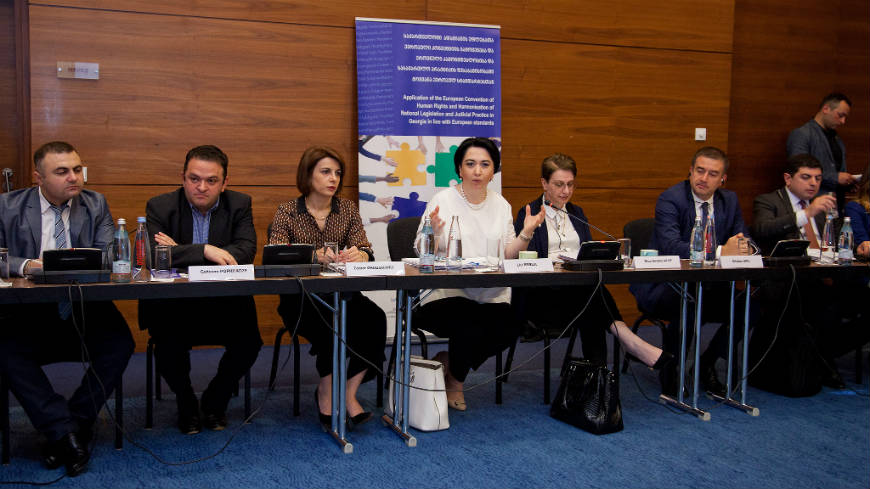On 1 July 2017 the European Union (EU) and the Council of Europe (CoE) in co-operation with Legal Issues Committee of the Parliament of Georgia organised a workshop on “Effective parliamentary oversight on execution of judgments of the European Court of Human Rights (ECtHR) by the government”.
The workshop brought together the high-level representatives of the Government, the Parliament and Judiciary.
Mr. Cristian Urse, Head of the Council of Europe Office in Georgia, Ms. Eka Beselia, Head of the Legal Issues Committee of the Parliament of Georgia, Ms. Tamar Chugoshvili, Vice President of the Parliament of Georgia and Ms. Nino Gvenetadze Chairperson of the Supreme Court of Georgia addressed opening remarks to the participants.
Mr. Cristian Urse declared: “This High level event illustrates the commitment of Georgia to fully execute the decisions of the Strasbourg Court. It is well known that the implementation of Strasbourg judgments benefits significantly from enhanced involvement of national parliaments. The parliament exercises an essential constitutional responsibility in holding the government accountable. Therefore, we welcome Georgia’s efforts to strengthen parliamentary oversight on execution of the ECtHR judgments by introducing new legislation allowing relevant parliamentary committees to carry out an effective control of the government’s performance. “
Ms. Eka Beselia underlined: “the use of effective parliamentary supervision mechanisms over the execution of judgments of the ECtHR is an important issue for the Council of Europe member states and numbers of resolutions of the Parliamentary Assembly of the Council of Europe (PACE) have been addressed to that subject. I, as the Chair of the PACE Sub-Committee on Oversight of Enforcement of Judgments of the ECtHR, am glad that we joined the leading European countries who have established this good practice. In 2016 we improved the regulations of the Parliament of Georgia and defined the Parliament's statute on oversight of enforcement of the ECtHR Judgments at the legislative level. For that reason I was invited to several international forums, where was asked to share with other countries our successful experiences.”
Ms. Tamar Chugoshvili said: “In recent years Georgia bears special responsibility for enforcement of European Court of Human Rights judgments and as a result number of claims decreased significantly, which shows that situation in country, in terms of human rights protection, improved considerably. In general, iimplementation of comprehensive supervision over the execution of the ECtHR judgments by the Government is a correct and efficient understanding of parliamentary control. Our regulation already includes the norm which says that the executive government has to present report on enforcement of Court judgments, as well as action plan of execution of ongoing cases, to the Parliament of Georgia no later than 1 April. The next stage of our democracy development is primarily related to the significant strengthening of the Parliament, particularly in the implementation of the supervisory function”.
Speakers from the executive, legislative and judiciary field discussed the role of the state in the process of a full, effective and prompt execution of ECtHR judgements and overviewed the state of execution of judgments against Georgia. At the same time representative of the Department for the execution of judgements of the ECtHR informed participants on working methods of the Committee of Ministers for supervision of the execution of the ECtHR judgments and on importance of effective data collection and coordination between state agencies.
The event was organised in the framework of the European Union – Council of Europe joint project “Application of the European Convention on Human Rights and harmonisation of national legislation and judicial practice in Georgia in line with European standards”, within the EU-CoE Partnership for Good Governance.

